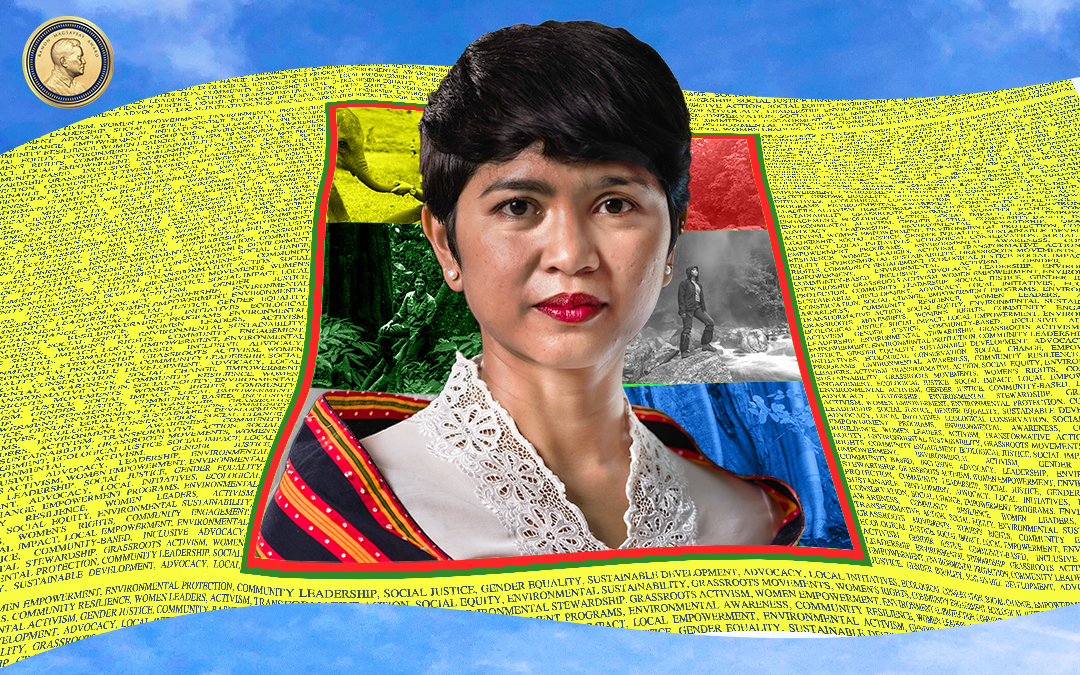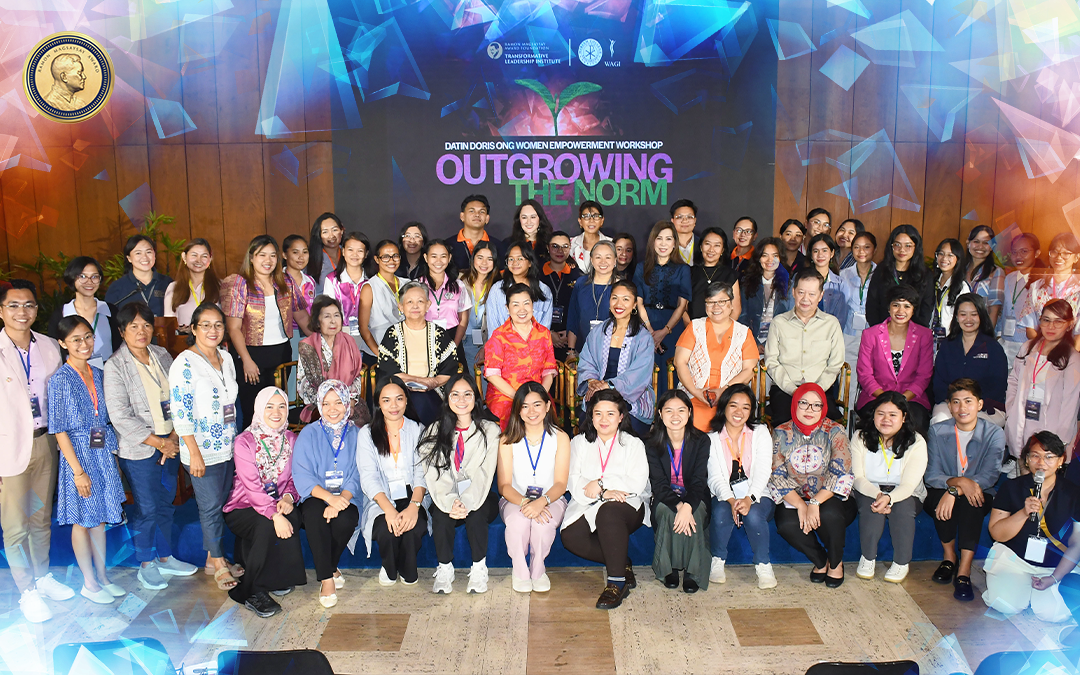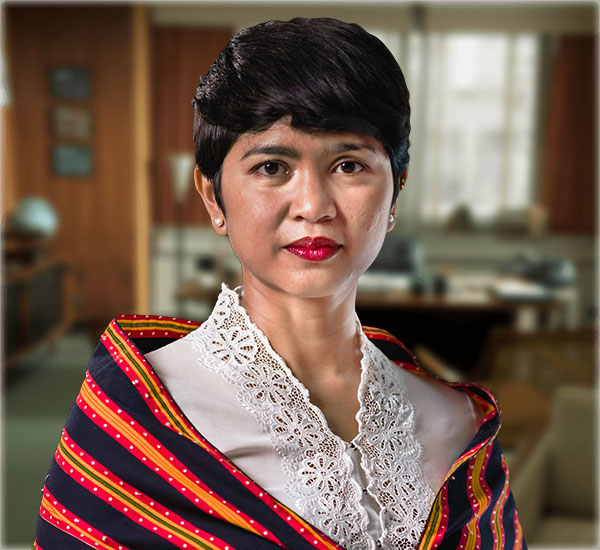- Indonesia’s Leuser Ecosystem in Sumatra, home to highly endangered species, faces severe threats from deforestation, infrastructure, and weak law enforcement despite its UNESCO World Heritage status and national protection. The situation worsened in 2013 when the Aceh government abolished the Leuser Ecosystem Management Authority, which had been fighting to protect it.
- FARWIZA FARHAN founded HAkA after witnessing the devastation of the Leuser Ecosystem. With a master’s degree in environmental management, she empowers local communities, especially women, to protect the ecosystem through advocacy, forest monitoring, and community engagement.
- Among other successes, HAkA helped to achieve a court verdict that led to USD 26 million in fines against a palm oil company that burned forests in the Leuser Ecosystem, and stopped a hydroelectric dam that would have threatened the elephant’s habitat. The money was used by the government to rehabilitate the damaged areas.
- The RMAF board of trustees recognizes her profound understanding of the vital connection between nature and humanity, her commitment to social justice and responsible citizenship through her work with forest communities, and her promotion of greater awareness of the need to protect the beating heart and lungs of her country’s and Asia’s rich but endangered natural resources.
As the world’s largest archipelago, Indonesia is blessed with abundant natural resources and biodiversity, but it has also come under severe pressure from human growth and exploitation. This is no more apparent than in Sumatra Island’s Leuser Ecosystem, a 2.6-million-hectare expanse in Aceh province where some of the world’s most highly endangered species have managed to survive.
However, despite being named a UNESCO World Heritage Site in 2004 and a protected National Strategic Area in 2008, the Leuser Ecosystem has continued to be ravaged by deforestation, infrastructure, commercialization, and weak law enforcement. Worse, the Leuser Ecosystem Management Authority or Badan Pengelola Kawasan Ekosistem Leuser (BPKEL), which had been fighting the ecosystem’s destructive intruders in court, was abolished by the Aceh government in 2013.
Instead of giving up, some BPKEL ex-employees got together to form a new organization called the Forest Nature and Environment of Aceh Foundation or Yayasan Hutan Alam dan Lingkungan Aceh (HAkA), dedicated to protecting, preserving, and restoring the Leuser Ecosystem.
Leading HAkA from the beginning was a young woman named FARWIZA FARHAN who saw in the Leuser Ecosystem an opportunity not only to save preserve nature at its best but also to engage local communities in securing their own future. Born in Aceh in 1986, FARHAN as a young girl had fallen in love with its natural beauty, leading her to dream of becoming a marine biologist and working in conservation. Pursuing her education overseas and returning as an adult with a master’s degree in environmental management, she was stunned and saddened to see how her beloved forests had been ravaged by commercial exploitation.
Taking it personally, she joined BPKEL. When it was shut down, she founded HAkA. Instead of depending solely on the government, HAkA believed in the power of local people, especially women, to safeguard the ecosystem through a vigorous advocacy campaign, forest monitoring, and community empowerment.
Since its establishment, among other successes, HAkA helped to achieve a court verdict that led to USD 26 million in fines against a palm oil company that burned forests in the Leuser Ecosystem, and stopped a hydroelectric dam that would have threatened the elephant’s habitat. The money was used by the government to rehabilitate the damaged areas.
But an equally important albeit less visible victory has been HAkA’s mobilization of Aceh’s citizens in protecting their environment. HAkA has done this, first, by informing the people about the Leuser Ecosystem and its importance, and also by including the ecosystem in the curricula of local schools and universities. HAkA has employed a geographic information system and other forest monitoring tools to assist local governments, communities, and universities in monitoring Aceh’s forest areas in real time. Looking to the future, HAkA also promoted community-based sustainable forest management to ensure improved management of forests.
HAkA’s programs for and with women are particularly effective and encouraging. Women are given paralegal and citizen-journalism training, engaged in micro-entrepreneurship, and organized into women-led ranger groups that patrol forest areas to monitor poaching and illegal logging. The women are supported by men who are similarly trained.
In a society where women have traditionally been relegated to secondary roles, none of these would have been possible without the energetic, courageous, and visionary leadership of FARHAN. A young Muslim, she has defied conventions to serve as an inspiration and a model for a new generation of Indonesian women coming into their own and taking charge of their lives and future. As HAkA’s chairperson, FARHAN has not led from the top, but rather from below, encouraging decentralization to promote sustainability and resiliency within the organization and develop the next ranks of environmental champions. She often works in the background and with local actors, but she also liaises with government officials, donors, and academics—anyone whom she can bring into the fold of HAkA’s concerns for Aceh’s environment and its people.
For her efforts, FARHAN has been recognized by many international institutions. Her greatest reward, however, has been to see HAkA’s initiatives bear fruit, not only in a resurgent forest and environment but also in the change of values and attitudes among the people she and HAkA have reached: “Throughout my training, we were taught that the local members of the community are often the perpetrators of illegal logging, of poaching, of destructions in wildlife habitats,” she observes. “But then, when you spend more time with them, you will realize that they are also the best protectors of wildlife. They are also dealing with the pressure of losing their lands and their rights as much as the animals are losing their habitats.” With foresight and tenacity, FARHAN is a prime exemplar of what can be done against all odds: “I can’t stop global temperature from changing, but if it’s the forest, there’s a bit more that I can do than surrendering to global challenges.”
In electing FARWIZA FARHAN to receive the 2024 Ramon Magsaysay Award for Emergent Leadership, the board of trustees recognizes her profound understanding of the vital connection between nature and humanity, her commitment to social justice and responsible citizenship through her work with forest communities, and her promotion of greater awareness of the need to protect the beating heart and lungs of her country’s and Asia’s rich but endangered natural resources.
The Board of Trustees of the Ramon Magsaysay Award Foundation, my fellow Ramon Magsaysay Awardees, members of the diplomatic corps, fellow activists, esteemed guests, ladies and gentlemen:
While I am humbled and honored to receive the Ramon Magsaysay Award for Emergent Leadership, the truth is, more than feeling humility and honor, I am in disbelief.
I could not believe that I am entrusted with this recognition – an Award that I would not even dare imagine.
I would like to thank the Board of Trustees of the Ramon Magsaysay Award Foundation for your trust, your support, but more so, the risk in bestowing me this Award.
Although it is my name inscribed on the medallion, this recognition and this achievement is not mine and will never be mine alone. The conservation work in the Leuser Ecosystem is being done by an entire community of dedicated and passionate individuals – from my colleagues at Yayasan HAkA, my co-founder, Badrul Irfan, our partners in the villages and at the government level, and in civil society as well as our donors and long-term supporters. This Award is theirs, and I stand before you to represent all of the people who are united in environmental protection.
Today, as we celebrate the good work that is being collectively done in the Leuser Ecosystem, the forest in Singkil Peatswamp located at its southwest corner continues to be decimated. This is proof that our work is far from over.
I am grateful that while there is so much more to be done, there are many people willing to collaborate with us. Together with Dhandy Laksono, my fellow Indonesians who received this same Award in 2021, we are launching a film called 17 Sweet Letters, a chronicle that poses the question: how well conserved are conservation areas in Indonesia?
As we roll out the promotion for this documentary, the authorities are already using tactics of intimidation to prevent its release and wide circulation. But it takes more than brute force to slow down a bunch of stubborn fighters like us. Bang Badrul, Rubama, Lukman, Irham, Fahmi, Agung dan Ikhsan, kegigihan dan ketangguhan kalian menjadi pilar kekuatan kerja-kerja kolektif kita. Your grit and determination have become the pillar of our collective work. I am grateful that we continue to find many stubborn fighters to be our allies. I hope you will join us in ensuring that the destruction of Singkil Peat Swamp is discussed in as many parts of Asia as possible.
In closing, please allow me to express my deepest love and gratitude to my parents, Dr. Ahmad Farhan Hamid and Ms. Ferry Soraya, the people who have raised me to be the person I am, and never give up on me when everything seems dark and impossible. Please stand up so others could see you too. Finally, no words could describe my gratitude to Prio Sambodho, the man who choose to marry this stubborn fighter and continue to support me in the work that I do.
Related Articles

Leuser Ecosystem Heroine among the 2024 Ramon Magsaysay Awardees
Sep 5, 2024

“Datin Doris Ong Women Empowerment Workshop: Outgrowing the Norm” Fosters Inclusive Leadership
Apr 10, 2025

